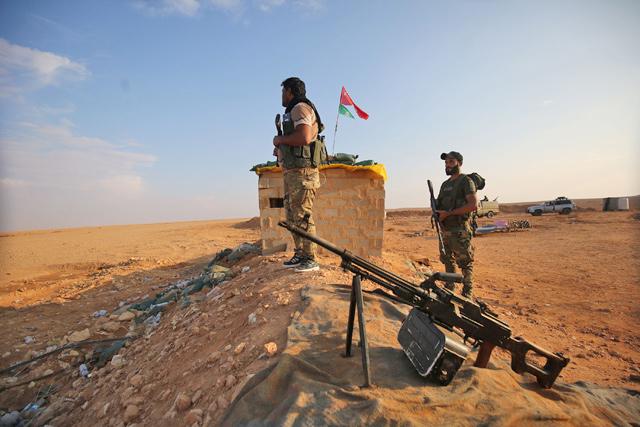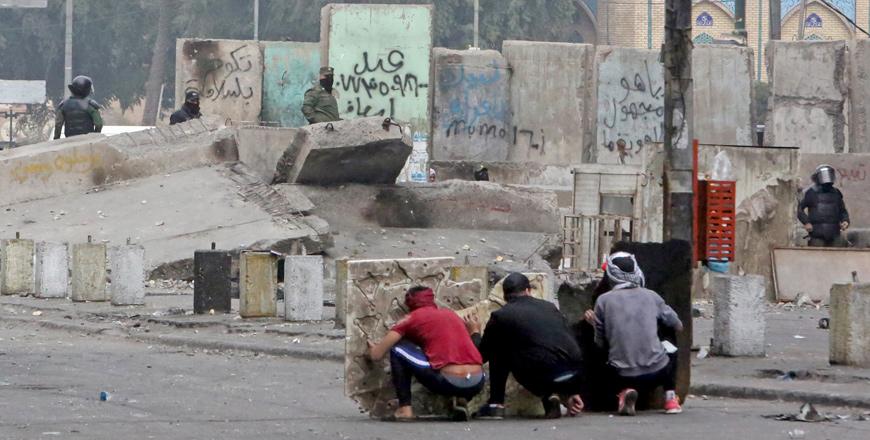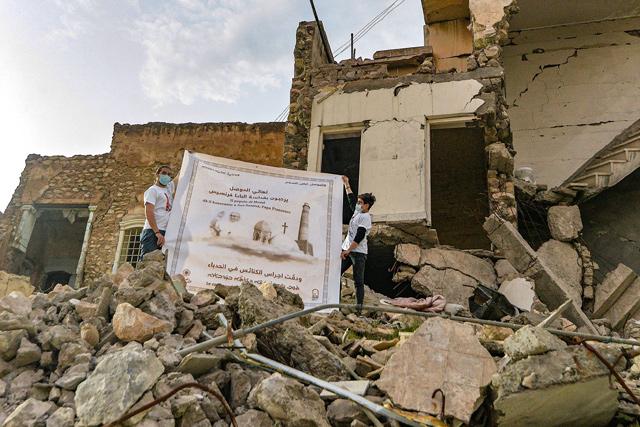You are here
Iraq fears escalation after deadly rocket attack, air strike
By AFP - Mar 12,2020 - Last updated at Mar 12,2020

In this file photo taken on November 12, 2018 an Iraqi Shiite fighter of the Hashed Al Shaabi paramilitary force secures the border in Al Qaim in the Anbar province, opposite Albu Kamal in Syria's Deir Ezzor region, on Thursday (AFP photo)
BAGHDAD — Iraqi and United Nations officials scrambled Thursday to contain the fallout from an unprecedented rocket attack that killed three US-led coalition members and threatened yet another escalation of Iran-US tensions.
Within hours of the attack on Taji air base, north of Baghdad — the deadliest in years on a base used by US forces in Iraq — an air strike killed more than two dozen Iran-aligned fighters in neighbouring Syria.
It marked a dramatic uptick in violence less than three months after rockets killed a US contractor in northern Iraq, unleashing a round of tit-for-tat attacks between Washington and Tehran on Iraqi soil.
Fearing an even bloodier flare-up this time, Iraqi officials and the United Nations were quick to condemn the coalition deaths.
Iraq's military command said it was "a serious security challenge" and pledged to open an investigation.
President Barham Saleh and parliament speaker Mohammed Al Halbussi condemned a "terrorist attack" which targeted "Iraq and its security".
The UN mission in Iraq called for "maximum restraint on all sides".
“These ongoing attacks are a clear and substantial threat to the country, and the risk of rogue action by armed groups remains a constant concern,” it said.
“The last thing Iraq needs is to serve as an arena for vendettas and external battles.”
Kataeb Hizbollah hails attack
Wednesday’s attack was the 22nd on US interests in Iraq since late October.
It saw a volley of 18 rockets slam into the Taji base, one of about a dozen facilities across Iraq where coalition forces are posted.
The coalition confirmed three of its personnel were killed and around a dozen more wounded.
One of the dead was a member of the Royal Army Medical Corps, Britain confirmed. A US military official told AFP the other two were a US soldier and an American contractor.
There was no immediate word on Iraqi casualties and no group claimed responsibility.
Kataeb Hizbollah, a faction within Iraq’s Hashed Al Shaabi paramilitary alliance, hailed the attack and its perpetrators, without saying they were behind it.
“We believe it is the best time for popular, nationalist forces to resume operations to oust the evil attackers,” the group said in a statement.
Kataeb Hizbollah also criticised “those who were quick to denounce and express their sympathy”, in a hint at top Iraqi officials who had condemned the rocket attack.
In late December, the US accused Kataeb Hizbollah of killing an American contractor at a base in northern Iraq and carried out air strikes on western Iraq that killed 25 of its fighters.
Days later, a US drone strike killed senior Iranian commander Qassem Soleimani and Hashed Deputy Chief Abu Mahdi Al Muhandis near Baghdad airport.
Iran then launched its own strikes on a western Iraqi base, leaving dozens of US troops suffering from brain trauma.
Hashed factions have repeatedly pledged to avenge Muhandis’s death in their own way.
Hashed hammered in Syria
Within hours of Wednesday’s attack, an air strike near the Syrian-Iraqi border town of Albu Kamal killed 26 Iran-aligned Iraqi fighters, the Syrian Observatory for Human Rights said.
The US-led coalition denied carrying out any raids overnight on either Syria or Iraq.
Both the coalition and Israel have targeted Iran-backed fighters in Syria, whom they fear could be transferring missiles from their regional foe Iran.
The Hashed also blamed Israel and the US for a string of unexplained explosions last year.
Post-Saddam Iraq counts years of close ties with both Iran and the United States, and Baghdad has been put in an increasingly difficult position by the spiralling tensions between its allies.
In January, Iraqi lawmakers voted to oust all foreign troops from Iraq in reaction to the killing of Soleimani and Muhandis.
Some 5,200 US troops are stationed in Iraq as part of the coalition formed in 2014 to fight the Daesh terror group.
While Daesh has lost all of the territory it once held in Iraq and Syria, sleeper cells remain capable of carrying out attacks on both sides of the border.
On Sunday, two US soldiers were killed north of Baghdad while helping Iraqi forces battle Daesh remnants.
US officials have previously told AFP they considered the Hashed a bigger threat than Daesh, given the frequency and accuracy of rocket attacks on US troops that could be traced back to the paramilitaries.
Related Articles
BAGHDAD — A fresh spate of rockets targeted an Iraqi base north of Baghdad on Saturday where foreign troops are deployed, Iraqi and US secur
BAGHDAD — Multiple rockets hit an Iraqi base hosting American troops near the US embassy early Sunday, the latest in a flurry of attacks aga
BAGHDAD — A US contractor died of cardiac failure after rocket fire hit an Iraqi base hosting coalition troops Wednesday, the Pentagon said,


















